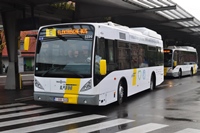
BELGIUM The first wirelessly charged all electric buses in Belgium, three Van Hools, have started operating in Bruges for De Lijn.
The inductive charging process using the PRIMOVE charging system takes a maximum of 12 minutes. During that time, a magnetic field transfers the electric energy from the charging station to the bus. The electric current in a primary coil creates the magnetic field. This induces a current in a secondary coil, which receives power.
A fully loaded battery enables one of the buses to drive 45 minutes without recharging. This is more than enough for the ride between Bruges railway station and the end stop at ’t Zand, one of the main squares in the city. After serving the route a few times back and forth, the buses are recharged. The route is served by two vehicles on weekdays and one on Saturdays. Each has a capacity of 44 passengers, of which 17 can be seated.
The electric buses are part of a Flemish government R&D project called EVTecLab. The project allows De Lijn and other transport companies to gain experience with pre-commercial vehicles, developed by Flemish companies. The overall project involves 20 vans, two trucks, three fully electric buses and one fuel cell bus. The vehicles are equipped with devices to log data while driving. EVTecLab uses the information collected to research electric propulsion technologies, energy consumption, ageing of batteries and driving behaviour.
€4.5m was invested in the R&D project, of which €1.5m went into the Van Hool electric buses and their inductive charging technology. Leclanché (previously called Trineuron) supplied the batteries and the overnight chargers. Flanders Make, iMinds and Brussels University Vrije Universiteit Brussel (VUB) provide scientific and technological expertise and support. Punch Powertrain coordinates the EVTecLab.
“I continue to invest in renewing De Lijn’s fleet,” said Ben Weyts, Flemish Minister of Mobility. “With modern, fast and comfortable vehicles, we will be able to convince more people to make the switch to public transport. The electric buses are not only the most environmentally-friendly of Belgium, they are also the quietest. This was all made possible through the joint competences of local, Flemish companies. We are truly investing in our future.”
Roger Kesteloot, General Director, De Lijn, said: “The electric buses offer two major advantages. First of all, the new e-buses are completely emission-free. They neither emit pollutants such as CO2 (generating greenhouse gases), NOx (acid rain, risk to health), nor fine particles (harmful to heart and respiratory system). As De Lijn only purchases green electricity, there is also no emission when producing the energy. Secondly, the buses are particularly silent due to the absence of a diesel motor. The only thing to be heard is a buzz. The bus is three times quieter than a normal diesel bus when leaving the stop.”

